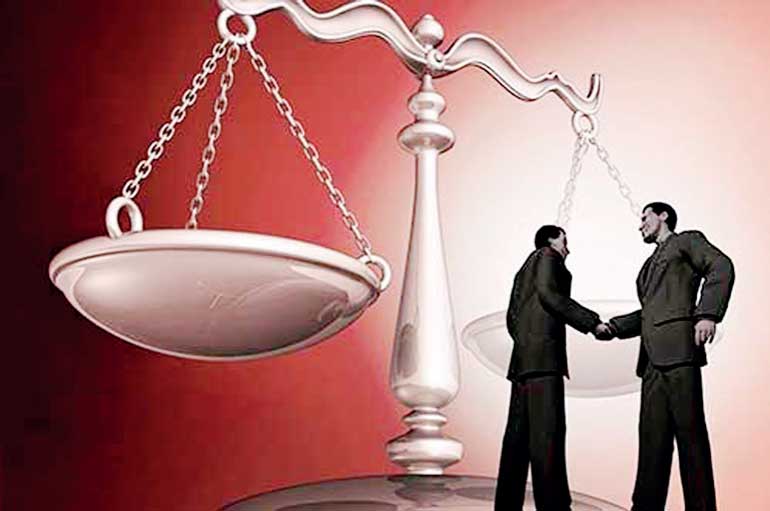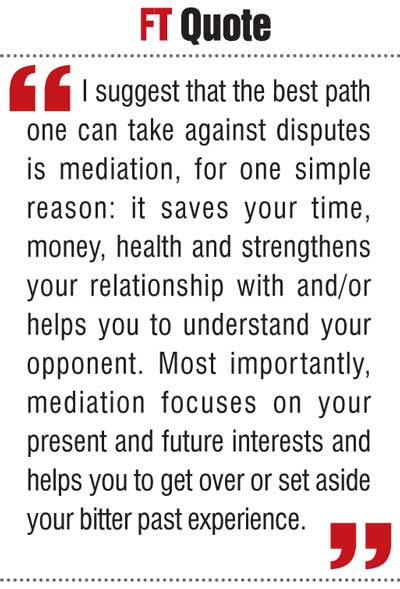Monday Feb 23, 2026
Monday Feb 23, 2026
Monday, 16 October 2017 00:00 - - {{hitsCtrl.values.hits}}

By Saranee Gunathilaka
Disputes are bitter experiences that steal our money, time and health, in the end for no good reason. Most of us know by now through experience that disputes are like magnets that we attract, no matter how much we try to live away from them. In fact, it is quite difficult or rather impossible for us to always evade disputes. Therefore, it is vital that we try to find a way in which we can settle these disputes without wasting our money, time and health. We will also be much happier if such a method can help us go forward in our lives by securing our interests.
I suggest that the best path one can take against disputes is mediation, for one simple reason: it saves your time, money, health and strengthens your relationship with and/or helps you to understand your opponent. Most importantly, mediation focuses on your present and future interests and helps you to get over or set aside your bitter past experience.
Mediation as we all know is a mode of amicable dispute resolution carried out with the facilitation of a neutral third party. When parties take their seats in mediation, they will come with anger, disappointment, dislike, displeasure, distress or, in the worst cases, hatred.
The first two or three sessions in mediation, depending on the level of the seriousness of the said feelings, help the parties to express and explore these feelings and to identify and differentiate their positions and interests. Thereafter the mediator will facilitate the parties and their advocates to consider as to whether they are willing to move away from their positions and to work towards safeguarding their interests. This is supported through joint sessions where the mediator will communicate, with the consent of each party, the reasons presented by parties during private sessions or joint session that effected the actions or inactions of each party which led to the dispute. A successful mediation will end with the parties agreeing to give up on their positions and coming up with creative solutions that safeguard their present and future interests.
Saving time
How does it truly save time? In mediation, your attorney does not have to file papers before the mediator the way he would otherwise have to do if you had opted to litigate. Your attorney, you or the particular mediation service provider (in Sri Lanka we do not see any mediation service providers) merely have to send an invitation to mediate to the other party. Upon the receipt of this, you and the other party may decide on whom to appoint as your mediator. Once both parties reach a mutual agreement on a mediator or three mediators, mediation can commence on days and times convenient to you all. Hence the mediation process is much more expedient and efficient as opposed to the court system, as you can decide on the time period you want to spend on resolving the said dispute and how fast you want to get a solution. You do not have to waste your time for other formalities and procedures as you would have had to in a court case.
 I believe that we all are aware of the fact that the court system takes years of your life for one case to be concluded and sometimes not only yours but your children’s and grandchildren’s lives in extreme cases, which are not really that rare.
I believe that we all are aware of the fact that the court system takes years of your life for one case to be concluded and sometimes not only yours but your children’s and grandchildren’s lives in extreme cases, which are not really that rare.
You might argue that if the mediation fails that would be a waste of time and further prolong the litigation process. Well, not really. From the point a dispute arises, if you opt for litigation, your attorney will still have to take a considerable period of time, at least a week or two, to draft and file papers. If you are not very confident as to what will be the outcome of the mediation process, you can do both simultaneously.
Try mediation for a week or two and if not file papers drafted by your attorney. You will not lose anything but you will have a better understanding of the situation by the time you go to court. However, since this is not happening in today’s context prior to litigation, after drafting papers, filing them in court, giving notice and even after supporting or sometimes in the middle of arguing the case, judges might invite you to settle if they then realise that there is a possibility to settle the case. By that time you would have already wasted at least one or two years due to many reasons (court holidays, delays in filling documents, personal reasons of your counsel, personal reasons of your opponent’s counsel, court not having free dates, etc.). Hence, don’t you think that it is much better to explore the possibility of an amicable settlement prior to running to court?
In light of this, my belief is that mediation undoubtedly saves your time and utilises it much more efficiently in dispute resolution as opposed to litigation.
Staying happy and healthy
‘Time is money’. This explains the notion as to how mediation saves your money. If, as discussed above, mediation saves your attorney’s time and your time, it saves your money on two levels. Firstly, you would not have to compensate your attorney for the time and effort spent.
Secondly, when your time is saved, you can invest that time in an income generating activity without sitting and waiting in a courthouse, the chamber of your attorney or your house, lamenting about your dispute.
‘Happiness is health’. Disputes come with distress and disappointment which always make us sick. Mediation takes the misery attached to disputes away from us. Won’t you be happy when your time and money is saved? Won’t you be happy when your disputes are resolved amicably? Won’t you be happy when your opponent, the one who accused you or whom you accused, finally shakes hands with you and agrees to go forward together or to depart without hard feelings? This is how mediation will keep you healthy.
‘Life is a gift’. Let’s enjoy this gift to the maximum without letting disputes ruin it. For these reasons, let me invite all of you to opt for mediation whenever you face a dispute prior to litigation.
(The writer is an attorney-a-law, lecturer and legal researcher who is reading for a Master’s in Human Rights and Democratization (University of Colombo). He is an accredited Commercial Mediator and Negotiator (IICA) who possesses a Diploma in Commercial Arbitration (ICLP), LLB (Hons.) (Colombo) and is a founding youth committee member of the Young Peacemakers of Sri Lanka – Peer mediation group, an initiative of Oxford Psychometrics (UK))